School of Teacher Education
Brown Bag Seminars
Past SeminarsInternational Projects without Leaving Home
Marge Maxwell, April, 2013
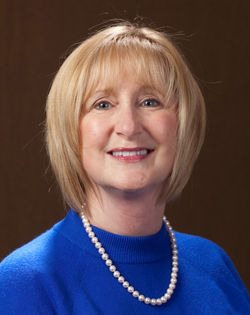
Marge Maxwell is an Associate Professor of Educational Technology in the Library Media Education program in the School of Teacher Education. Her LME 545 Educational Technology Production course centers around a Global Partnering Project where students have two project choices: (1) Students who are classroom teachers may locate a penal class in another country. The two classes will conduct collaborative projects on a real world topic of interest to both countries. (2) Students may select a global issue (such as world hunger, poverty, health, environmental, arms control, fair trade, endangered animals, etc.) and partner with an international organization promoting that issue. Most of the international organizations provide ways to partner with them and get involved.
Students develop a mashup website that includes at least three technology products about their topic. They must demonstrate collaboration with their penal class or their selected organization. Students used a variety of online tools to create their websites including Weebly.com, googlesites.com, wordpress.com, yolasite.com, people.wku.edu, wikispaces.com. Technology products included a poem demonstrated on Animoto.com, videos using data indicators from gapminder.com, presentations with Prezi.com, animations with Xtranormal.com or Voki.com, stories using storybird.com, group discussions with voicethread.com, and many more. One student was so excited about his topic that he created his own nonprofit organization to support his cause even after the course was over!
At the end of the session Dr. Maxwell began a group discussion by having the STE faculty use their cell phones to text their answer to a question in polleverywhere.com about their inclusion of international projects in their WKU courses. Dr. Maxwell is happy to talk to anyone who is interested in using technology tools to make global projects come alive!
Download Presentation(PPT ![]() )
)
Educational System in Japan
Tadayuki Suzuki, August 2012
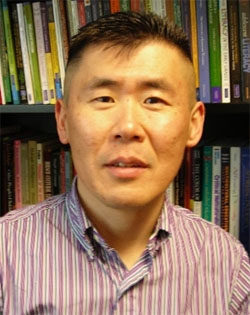
Dr. Suzuki is an associate professor of literacy education in the School of Teacher Education. He spoke about the educational system in Japan and the differences between education in the U.S. and Japan. Adjusting to a new learning environment and getting accustomed to the cultural differences were hard for him when he came to the U. S. as a graduate student. Additionally, it was even harder for him to adjust to a higher educational system as a new faculty member when he came to WKU in 2005. Based on his own experiences as an international graduate student and a new faculty member at WKU, he shared with us how he adjusted to a new environment and how we can assist our future international faculty members at the School of Teacher Education.
Project GATE: Global Approaches to Teacher Education
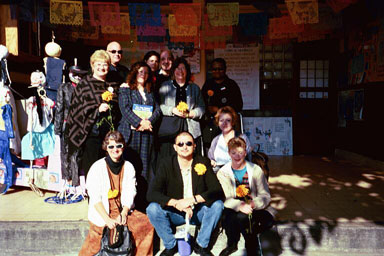
Cindy Houston and Vicki Stayton, 2/10/2012
Funding Agency: U.S. Department of Education, Undergrad International Studies and Foreign Language
Program
Funding Amount: $320,000 ($160,000 from funder and $160,000 match from WKU)
Project Director: Vicki D. Stayton, Ph.D.
The two primary goals of Project GATE were to:
- Enhance teacher education curricula specific to cultural diversity and international content, and
- Expand international student teaching opportunities.
These goals were accomplished through the collaboration of a cross-disciplinary and cross-College working committee with faculty representation from Interdisciplinary Early Childhood Education (IECE), Elementary Education (ELED), Middle Grades Education (MGE), Secondary Education (SEC), Modern Languages, English as a Second Language (ESL), and WKYU television. This committee facilitated the development of curricular materials related to cultural diversity and international content for each of these teacher education programs with committee members serving as liaisons to their respective program areas. The working committee also explored options for additional international student teaching placements in various locations in Mexico.
The cross-curricular integration of international/diversity content in the IECE, ELED, MGE, and SEC programs was accomplished through the development and implementation of the following:
- A cultural and linguistic diversity disposition/attitude survey administered at three points in each curriculum (i.e., introductory course, mid-point methods course, student teaching seminar),
- Two common critical performances required across the programs in designated courses,
- Instructional modules with professionally developed videos to be implemented in designated courses within each program.
Some of the College of Education and Behavioral Sciences' (CEBS) first international teaching opportunities were developed and enhanced through Project GATE. Through this project faculty visited possible student teaching sites in a variety of locations in Mexico and began discussions to establish agreements for placements for students in Early Childhood through High School classrooms. At the time of this project, CEBS had limited infrastructure to support funding, advising, and actual international placements. As part of this initiative, Project GATE's working committee investigated international student teaching initiatives through other universities with whom collaborative placements and supervision might be accomplished.
Several lessons were learned through acquisition and implementation of this project which can be applied to potential projects today. These are:
- Seek funding sources not traditionally accessed by Colleges of Education and think creatively if a budget match is required.
- Actively collaborate within the College, University, and across campuses to modify curriculum and create new opportunities for international placements as a means to strengthen such initiatives and to prevent duplication of efforts. In such a collaborative effort, it is essential to specify roles.
- Such a model for curriculum development and implementation can be maintained over time with ongoing commitment from faculty to continually update materials and seek out additional diverse field placements.
- Such initiatives can provide outcomes data for accreditation purposes.
International Sustainability and Classroom Instruction
Terry Wilson, 11/18/2011
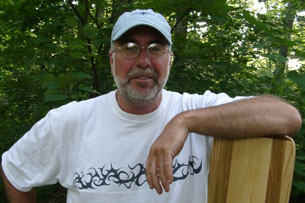
Dr. Wilson spoke about his various opportunities to do international work in the field of environmental education and sustainability. He briefly described his good fortune to be able to conduct environmental education training in Bhutan, Malaysia, Russia, and Taiwan. He also shared some of his personal professional development, particularly in Austria, where he was part of a Kentucky delegation to learn about sustainable living and education for sustainability. This included how schools in the state of Vorarlburg, Austria, have embraced environmental sustainability as a major thread in the fabric of their education system, which is a reflection of their society as well. He also challenged faculty to take advantage of any opportunity to become involved with international activities, urging them to be sensitive and respectful of the people and their cultures.
Summer 2011 Korean Studies Workshop
John Moore, 10/14/2011
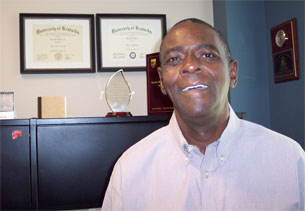 The first Brown Bag Serminar (BBS) for the School of Teacher Education was held on
Friday, October 14, 2011 immediately following the faculty meeting. Dr. Sherry Powers
provided the first "brown bag" lunches for the faculty members who stayed to participate.
Dr. S. Kay Gandy presented results of the Faculty Survey (download PPT) on International Work and Dr. John Moore spoke about his journey to South Korea.
The first Brown Bag Serminar (BBS) for the School of Teacher Education was held on
Friday, October 14, 2011 immediately following the faculty meeting. Dr. Sherry Powers
provided the first "brown bag" lunches for the faculty members who stayed to participate.
Dr. S. Kay Gandy presented results of the Faculty Survey (download PPT) on International Work and Dr. John Moore spoke about his journey to South Korea.
As National Council for the Social Studies President Elect, Dr. Moore was invited to participate in the Summer 2011 Korean Studies Workshop with 33 American social studies educators. The workshop is sponsored by Korea University and The Korea Foundation (for more information, go to koreasociety.org). The specific objectives of the Korean Studies Workshop are as follows:
a) the development of extensive Korean studies-related syllabi for overseas scholars.
b) the development of Korean studies teaching and research materials on Korean Studies for overseas scholars.
c) The exchange of ideas and views, and the development of personal contacts between members of participating nations.
For his middle level and secondary WKU social studies teacher education students, Dr. Moore developed a model instructional plan entitled Two Case Studies of Women in Colonial America and Colonial Korea (download PDF).
CONTACT THE SCHOOL OF TEACHER EDUCATION
Gary A. Ransdell Hall, Office 1005
1906 College Heights Blvd. #11030,
Bowling Green, KY 42101-1030
Some of the links on this page may require additional software to view.

